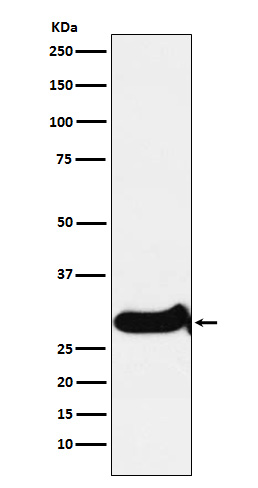
| WB | 1/500-1/1000 | Human,Mouse,Rat |
| IF | 咨询技术 | Human,Mouse,Rat |
| IHC | 1/50-1/100 | Human,Mouse,Rat |
| ICC | 1/50-1/200 | Human,Mouse,Rat |
| FCM | 1/50-1/100 | Human,Mouse,Rat |
| Elisa | 咨询技术 | Human,Mouse,Rat |
| Aliases | IGFBP7; MAC25; PSF; Insulin-like growth factor-binding protein 7; IBP-7; IGF-binding protein 7; IGFBP-7; IGFBP-rP1; MAC25 protein; PGI2-stimulating factor; Prostacyclin-stimulating factor; Tumor-derived adhesion factor; TAF |
| Entrez GeneID | 3490 |
| WB Predicted band size | Calculated MW: 29 kDa; Observed MW: 29 kDa |
| Host/Isotype | Rabbit IgG |
| Antibody Type | Primary antibody |
| Storage | Store at 4°C short term. Aliquot and store at -20°C long term. Avoid freeze/thaw cycles. |
| Species Reactivity | Human,Mouse,Rat |
| Immunogen | A synthesized peptide derived from human IGFBP7 |
| Formulation | Purified antibody in PBS with 0.05% sodium azide. |
+ +
以下是关于IGFBP7抗体的3篇参考文献的简要概括(文献标题、作者及摘要内容):
1. **标题**: *IGFBP7 is a p53-responsive gene involved in senescence and tumor suppression*
**作者**: Wajapeyee N, et al.
**摘要**: 研究通过免疫印迹和免疫组化(使用IGFBP7抗体)发现,p53通过诱导IGFBP7表达促进细胞衰老,抑制黑色素瘤生长,提示IGFBP7作为抑癌因子的潜在作用。
2. **标题**: *IGFBP7 binds to the IGF-1 receptor and blocks its activation by insulin-like growth factors*
**作者**: Sprenger CC, et al.
**摘要**: 利用IGFBP7特异性抗体进行蛋白质互作实验,发现IGFBP7通过直接结合IGF-1受体抑制下游信号通路,为靶向IGF通路的癌症治疗提供新思路。
3. **标题**: *Prognostic value of IGFBP7 in hepatocellular carcinoma revealed by immunohistochemistry*
**作者**: Kuo TC, et al.
**摘要**: 通过IGFBP7抗体对肝癌组织进行染色分析,发现高表达IGFBP7与患者生存期延长相关,提示其作为肝癌预后标志物的潜力。
以上文献均涉及IGFBP7抗体在机制研究或临床检测中的应用,涵盖肿瘤抑制、信号通路及疾病预后方向。
**Background of IGFBP7 Antibody**
Insulin-like growth factor-binding protein 7 (IGFBP7), a secreted glycoprotein, belongs to the IGFBP family but exhibits distinct affinity for insulin over IGFs. It plays multifaceted roles in regulating cell growth, apoptosis, angiogenesis, and senescence, often acting as a tumor suppressor. Structurally, IGFBP7 contains an IGF-binding domain and a thyroglobulin-type-I domain, enabling interactions with extracellular matrix components and signaling molecules like TGF-β. Its expression is modulated by pathways such as Wnt/β-catenin and epigenetic mechanisms, including promoter hypermethylation in cancers.
IGFBP7 antibodies are critical tools for detecting its expression in research and diagnostics. In oncology, these antibodies help assess IGFBP7 downregulation in melanoma, hepatocellular carcinoma, and colorectal cancer, correlating with tumor progression and prognosis. They are also used in studying fibrotic diseases (e.g., liver and kidney fibrosis) and age-related conditions like cardiovascular disorders. Commercially available IGFBP7 antibodies (polyclonal/monoclonal) support techniques like Western blotting, immunohistochemistry, and ELISA. Their therapeutic potential is under exploration, particularly in targeting IGFBP7 pathways to restore its tumor-suppressive functions or modulate fibrosis. Thus, IGFBP7 antibodies hold significant value in both mechanistic research and clinical applications.
×